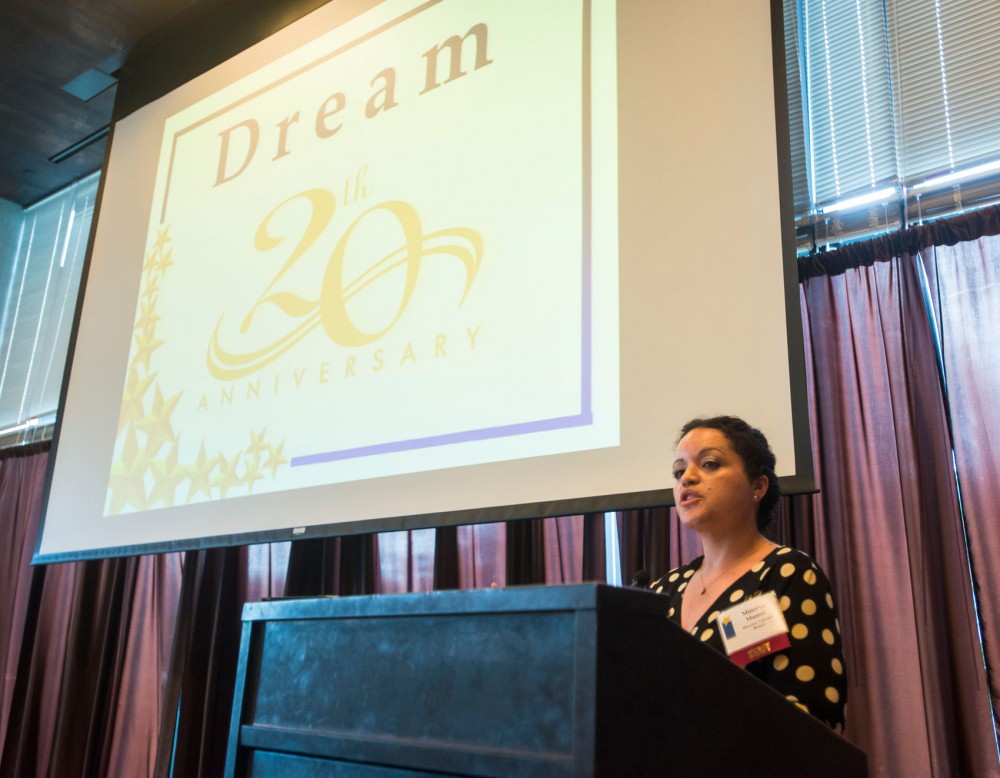Derran Bedward’s parents didn’t go to college, but he grew up knowing he would — even if it wasn’t always clear how he’d get there.
“All my life, I’ve always been about breaking cycles,” he said.
Bedward is one of 460 students who have participated in the University of Minnesota’s college readiness program, TRiO Upward Bound, and have also benefited from the “I Have a Dream” Scholarship over the past two decades. All Minnesota program participants receive the scholarship if they complete the program and go on to college.
Current and former scholarship recipients, along with University faculty members and administrators, gathered for their annual event Thursday to celebrate the success of the scholarship.
“This ceremony is one of the best illustrations of the profound impact financial investments in marginalized and often underrepresented communities can make when it is coupled with intentional and strategic programming,” said Minerva Munoz, University Upward Bound director.
Minnesota has one of the widest achievement gaps for students of color in the nation, according to the University’s College of Education and Human Development.
Upward Bound, which began nationally in 1964, started at the University in 1966 in an effort to combat education inequalities nationwide. It’s part of TRiO, a national program that works with first-generation college students and is housed at the University within CEHD.
TRiO was part of the General College until the college was dissolved in 2005.
The University collaborates with three Minneapolis high schools to provide Upward Bound services to students.
The scholarship began in 1991. For every year a high school student meets the program requirements, they receive a $1,000 scholarship to attend any college they want.
Increasing accessibility
The scholarship can be used for a variety of educational expenses. It makes opportunities like summer classes and study abroad programs accessible to program participants, many of whom are from low-income backgrounds.
Hayat Hassen, a recent University graduate, used the funds for classes in the summer, when financial aid can be scarce.
“I was able to work really hard to maintain my grades and pay off my … summer loan,” she said. “In general, Upward Bound and the scholarship was really helpful for me.”
Daisy Hidalgo said she “never thought of college before Upward Bound.”
Today, Hidalgo is a political science sophomore at the University with plans to attend law school.
Hidalgo used some of her award funds to pursue a study abroad program, an opportunity she said she wouldn’t have had without the scholarship.
Preparing for college
While in Upward Bound, high school students from the three Minneapolis schools must meet various requirements, including attending a five-week program every summer at the University. During that time, students attend high school-level classes and live in on-campus dorms.
The University’s program stands out from other Upward Bound summer institutes, said Zach Easty, a TRiO math teacher who has worked with Upward Bound in other states.
“This is my third Upward Bound program I’ve [taught with],” he said, “and it is the most well-grounded program I’ve been a part of.”
The requirements can be daunting, said Antonio Moore, who recently graduated from the University with a sociology degree after going through Upward Bound.
“I’m very grateful to be part of the program, but when I was in the program [in high school] there were times when I wanted to do other things,” he said. “If it wasn’t for [Munoz] telling me to continue on, I don’t know where I would be.”
Keeping students in school is a major goal for Upward Bound and the other TRiO programs, Munoz said, because many students in the program face difficult hurdles.
“Many of these ‘Dream’ scholars come from families who maybe didn’t know the language or maybe never had received formal education,” Munoz said. “Some of these successes come from individuals whose first real bed was living at the dorms at the University of Minnesota.”


